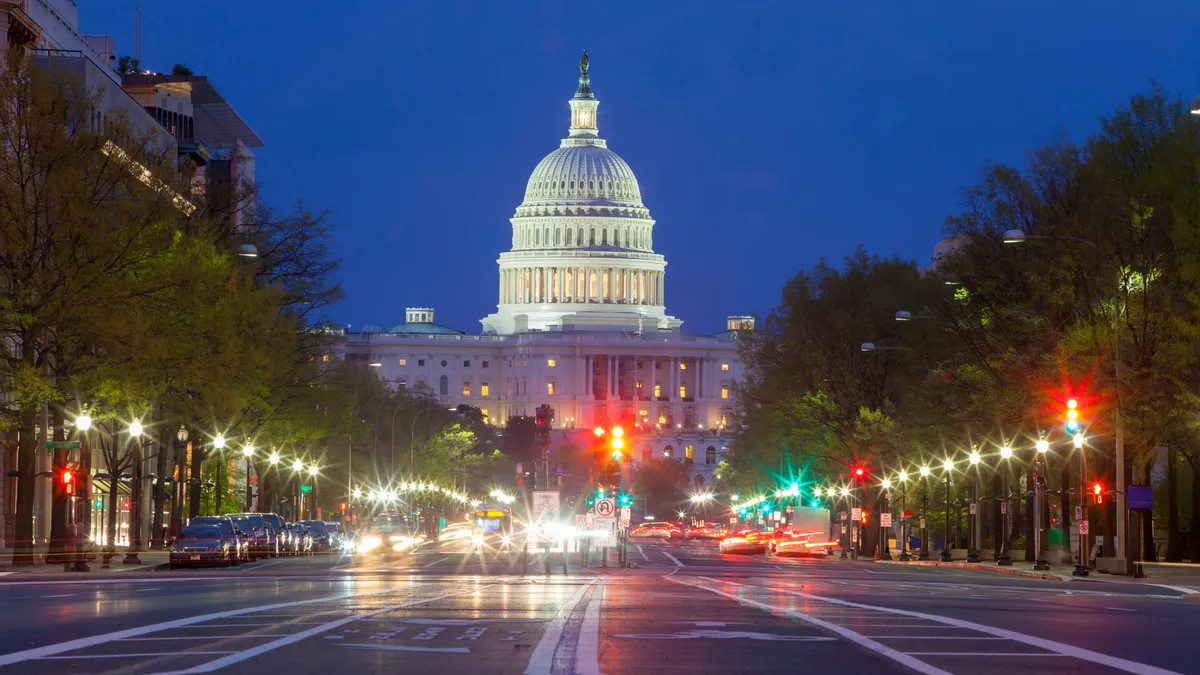Dive Brief:
- The U.S. House of Representatives on Thursday passed a broad, Republican-backed energy policy reform package with provisions to enhance cybersecurity, boost efficiency standards and alter federal energy regulations, The Hill reports. It faces a veto threat from President Obama.
- Sen. Lisa Murkowski (R-AK), chair of the Senate Energy and Natural Resources Committee, said on the same day that her chamber's broad energy bill — which, unlike the House version, includes Democratic support — would likely not come up for a vote until early next year.
- A scaled-down version of the House bill passed the Energy and Commerce Committee this summer with unanimous support, but Democrats walked away from the bill after the addition of several contentious amendments.
Dive Insight:
Federal energy laws and regulations have not been updated since 2007, the Hill reports, but that could soon change.
The House bill, sponsored by Rep. Fred Upton (R-MI), passed 249-174. The bill reportedly aims to enhance grid infrastructure, cybersecurity and effiency standards, as well as scale back some federal regulations.
“A decade ago no one could have imagined where we would be in 2015 and how much the energy script would be flipped in our favor,” Upton said, according to the Hill. “But now that we are here, it is time to bring our energy policy in line with the new realities. It’s time we put the scarcity mindset in the rear view mirror and say yes to energy and yes to jobs.”
The bill garnered earlier support from Democrats, but they walked away after GOP members added a series of new provisions after the bill left committee.
The one central theme to those numerous provisions is "an unerring devotion to the energy of the past," Rep. Frank Pallone Jr. (D-NJ), the committee's ranking member, told The Hill.
“Provision after provision favors an energy policy dominated by fossil fuels and unnecessary energy use," he said. "It is the Republican Party's 19th century vision for the future of U.S. energy policy in the 21st century.
The White House also came out against the bill last week, after the addition of regulatory provisions that would permit crude exports and speed up permitting for pipelines like Keystone XL. The bill also aims to ease permitting of transmission lines that cross international borders.
In the face of a veto threat, one route forward for some of the House provisions could be integrating them into a bipartisan Senate bill. The Energy and Natural Resources Committee in that chamber has been crafting a bipartisan energy policy package since this summer, and it retains strong support from Democratic members.
At an event on Thursday hosted by The Hill and ABB, Sen. Martin Heinrich (D-NM) praised the committee's efforts, saying it has "struck the right balance" in its bill and calling the drafting process a "window into regular order" in the Senate.
This summer, Sen. Lisa Murkowski (R-AK), the chair of the committee, called for policy proposals from members on both sides of the aisle, with the aim of combining them into a comprehensive bipartisan energy bill. That call yielded a number of novel policy proposals, including a national storage mandate introduced by Heinrich and Sen. Angus King (I-ME). Murkowski herself introduced 17 bills in one day during the drafting process.
At the event on Thursday, the Alaska senator said a full vote on the Senate bill is unlikely before the new year, but would probably happen early in 2016. The partisan nature of Rep. Upton's bill is to be expected from House legislation, she said, but "there is room to meld the two together."
The bipartisan nature of the Senate energy bill could bode well for efforts to extend federal tax credits for the solar industry, Murkowski told Utility Dive after the event. While she is not on the committee debating tax extenders, "we know that this is at play, and that is very significant," she said. "Is it bipartisan? I think probably so."














